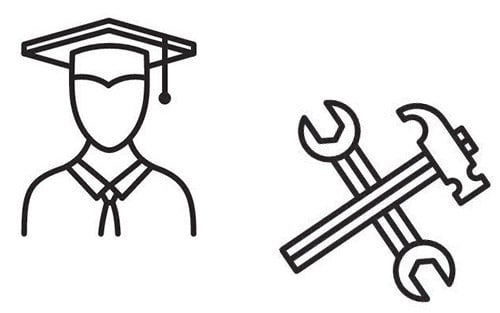Most of you know I love leadership-oriented youth organizations, and FFA is my favorite in this category. Growing up as a farm kid and milking cows each morning before classes, I understand how an agribusiness work ethic can transcend into entrepreneurial business successes.
In the spirit of helping the next generation of agriculturalists pursue the opportunities that align with their interests the closest, I thought I would share some comparative points between career tech and college.
There are many differences, but there are also some similarities. For example, both educational systems offer online classes. Both college and trade schools have job placement and career services.
Choosing a career path is not just about the money; it’s about your personal growth.
If you prefer starting a career sooner instead of waiting four to six years to complete college, or if you like learning practical skills in the classroom instead of gaining book knowledge, then a trade school is a viable choice. Some trade positions are earning up to $90 per hour based on supply and demand, and subject-matter expertise.
But if you are planning a professional career, are attracted to international studies or are interested in a wide array of subjects, college is an important consideration. College is also required to earn a master’s degree or a doctorate, which opens the door to many high-paying jobs and continued learning opportunities.
Make the choice with factors like budget, personal life goals, education timeline and an understanding of how you learn best. Talk to FFA leaders and school counselors, visit local institutions, evaluate programs, and speak with graduates and other students to learn from their experiences. Do your homework, prepare to dig in and have fun.
Pros of Trade School Education
• Is more affordable
• Has increasing job salaries
• Starts and finishes faster than college
• Has smaller class sizes
• Offers a robust job-placement program
• Has a wide variety of trade programs, including high-precision skills training
• Is typically local and more accessible – no dorm costs
Pros of College Education
• Has more potential for better-paying jobs
• Has greater upward salary trajectory
• Has extensive class and career path options
• Gives exposure to a broad range of educational experiences
• Is a must-do for professional career fields and advanced education
• Gives a degree that stays with the individual despite career and field changes
• Helps develop a world view
FFA offers many scholarships to students attending trade schools and college alike. Check out all scholarships at FFA.org/Scholarships. To learn more about careers in agriculture, visit AgExplorer.FFA.org.
Written by guest author Bob Funk Sr., the founder, president and board member of Express Employment Professionals, and an FFA donor and supporter.












